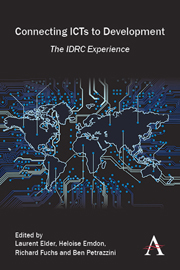Book contents
- Frontmatter
- Contents
- Acknowledgments
- Introduction Part I From Heresy to Orthodoxy: ICT4D at IDRC
- Introduction Part II From Beginning to End to Beginning Again
- Chapter 1 Catalyzing Access through Social and Technical Innovation
- Chapter 2 Catalyzing Access via Telecommunications Policy and Regulatory Research
- Chapter 3 Access to Knowledge as a New Paradigm for Research on ICTs and Intellectual Property
- Chapter 4 ICTs and Social Inclusion
- 5 Access and Usage of ICTs by the Poor (Part I)
- Chapter 6 Local Economic Opportunities and ICTs: How ICTs Affect Livelihoods (Part II)
- Chapter 7 Research on eHealth across Health Systems: Contributions to Strengthen a Field
- Chapter 8 Making the Grade: The Role of ICTs in Providing Access to Knowledge
- Chapter 9 E-Government for Development: ICTs in the Public Sector and the Evolving Citizen–Government Relationship
- Chapter 10 Innovations in Evaluating ICT4D Research
- Chapter 11 Conclusions: A Decade of Innovation that Matters
- Epilogue Into the Future: New Opportunities and Threats in a Global Networked Society
- Author Biographies
Chapter 10 - Innovations in Evaluating ICT4D Research
from Introduction Part II - From Beginning to End to Beginning Again
Published online by Cambridge University Press: 05 March 2014
- Frontmatter
- Contents
- Acknowledgments
- Introduction Part I From Heresy to Orthodoxy: ICT4D at IDRC
- Introduction Part II From Beginning to End to Beginning Again
- Chapter 1 Catalyzing Access through Social and Technical Innovation
- Chapter 2 Catalyzing Access via Telecommunications Policy and Regulatory Research
- Chapter 3 Access to Knowledge as a New Paradigm for Research on ICTs and Intellectual Property
- Chapter 4 ICTs and Social Inclusion
- 5 Access and Usage of ICTs by the Poor (Part I)
- Chapter 6 Local Economic Opportunities and ICTs: How ICTs Affect Livelihoods (Part II)
- Chapter 7 Research on eHealth across Health Systems: Contributions to Strengthen a Field
- Chapter 8 Making the Grade: The Role of ICTs in Providing Access to Knowledge
- Chapter 9 E-Government for Development: ICTs in the Public Sector and the Evolving Citizen–Government Relationship
- Chapter 10 Innovations in Evaluating ICT4D Research
- Chapter 11 Conclusions: A Decade of Innovation that Matters
- Epilogue Into the Future: New Opportunities and Threats in a Global Networked Society
- Author Biographies
Summary
Approaches to evaluation can be conceptualized in several ways. Alkin and Christie (2004) categorize evaluation theory into three branches of an “evaluation tree”: approaches that prioritize use, methods or valuing. Those who position themselves on the use branch orient evaluation toward decision making and practice change. Approaches on the methods branch tend to be most concerned with particular research methods guiding the evaluation. The valuing branch emphasizes who gets to judge the value and worth of the project, program or policy under review.
While all three approaches have value and are not mutually exclusive, the International Development Research Centre (IDRC) orients itself toward the “use” branch. All IDRC's evaluation systems and processes are designed and implemented in ways to ensure evaluation studies have a clear use and respond to the needs of a particular user whether the user is management, program staff or a group of recipients forming a research network. With use as its anchor, IDRC then balances the other requirements of high-quality evaluation: feasibility, ethics and rigorous methods. As a result, IDRC does not advocate any particular evaluation content, model, method, approach, theory, design or even use. Rather, it advocates employing the methodologies most appropriate to achieving the desired use. In this way, IDRC's approach to evaluation mirrors its approach to research for development; research must be for development and not just about development (IDRC 2010).
- Type
- Chapter
- Information
- Connecting ICTs to DevelopmentThe IDRC Experience, pp. 241 - 266Publisher: Anthem PressPrint publication year: 2013



